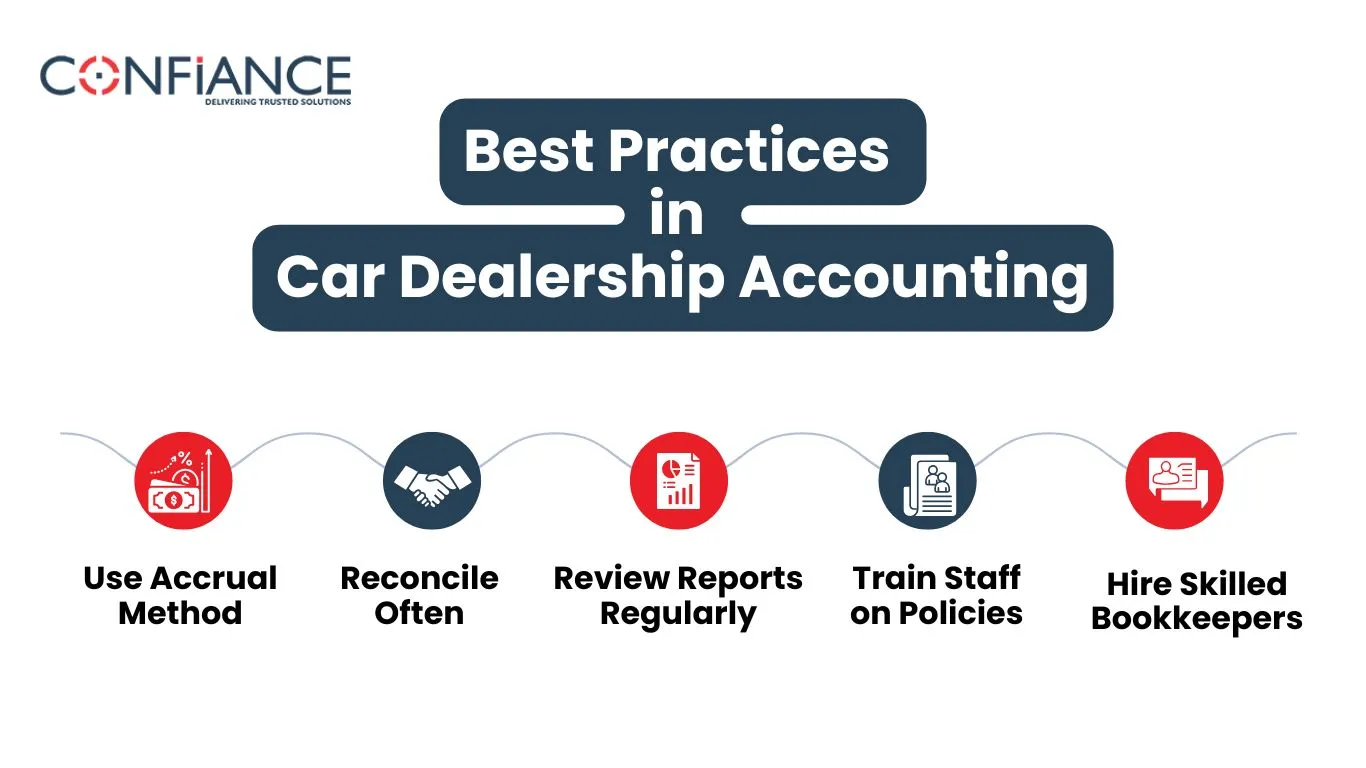
Main Aspects of Accounting for Car Dealership
Car dealerships face unique financial tasks. They must manage a high volume of sales, various costs, complex inventory, and changing taxes. Accurate accounting helps owners track profit, keep expenses under control, and stay compliant. This guide breaks down the main aspects of accounting for car dealership operations.
Why Accounting for Car Dealership Matters
Accounting for car dealership operations is not just about tracking sales. It includes monitoring floor plans, commissions, repairs, warranties, and customer payments. Without clear records, a dealership can lose money or face audit issues.
Accounting also helps managers understand how well each department is doing. It shows which services bring in more profit and where to cut costs. With clear numbers, decisions become faster and better.
Core Functions in Car Dealership Accounting
1. Inventory Management
Car inventory is different from regular goods. A single unit, like a car, holds high value and comes with its own loan, cost, and depreciation. Dealerships need to:
- Record each car as an asset when it enters inventory
- Match cost to each car sold
- Update books when vehicles are transferred between lots or sold
- Track used and new cars separately
Proper inventory tracking helps reduce loss and ensures accurate cost reports.
2. Floor Plan Financing
Dealers often use floor plan loans to finance new cars. Each vehicle is tied to a short-term loan. When a car sells, the dealer pays off that part of the loan.
Accountants need to:
- Track interest payments by vehicle
- Monitor loan balances for each unit
- Post floor plan costs in the right period
- Reconcile accounts with lender reports
Missed payments or mismatches can lead to interest overcharges or bank disputes.
3. Revenue Recognition
In car dealership accounting, sales must be posted on delivery. Not when the deal is signed, but when the customer takes the car. That includes:
- Recording vehicle price
- Including dealer add-ons
- Applying discounts or rebates
- Tracking trade-in values
F&I (finance and insurance) income must also be recorded once services are accepted and activated.
4. Cost of Goods Sold (COGS)
To get true profit, dealers must match the cost of the sold car to the sale. COGS includes:
- Car purchase price
- Transport costs
- Prep or service costs before sale
COGS reporting must be accurate for tax filings and to measure gross profit.
5. Payroll and Commissions
Sales staff often earn commission, not just salary. The accounting team must:
- Track base pay and variable pay
- Post commissions when deals are closed
- Deduct taxes on total earnings
- Reconcile payroll with dealership performance
Service technicians may have flat rate hours, adding more detail to payroll entries.
6. Departmental Accounting
Car dealerships often have several departments:
- New car sales
- Used car sales
- Service and repair
- Parts
- Finance and insurance
Each needs its own profit and loss tracking. Department-level records help managers find which areas perform better and which need attention.
7. Sales Tax and Regulatory Compliance
Dealership accounting must cover state and local sales tax. Rules may differ by:
- Vehicle type
- Buyer location
- Trade-in status
Also, dealerships handle title, registration, and fees on behalf of buyers. Accountants need to:
- Post taxes collected
- File returns on time
- Reconcile with state reports
- Handle audit requests
Failure to report taxes can lead to fines or license issues.
8. Accounts Receivable and Payable
Most dealers offer credit, extended service plans, or financing. These create receivables. On the flip side, dealers must pay vendors, lenders, and staff.
Good car dealership accounting tracks:
- Customer balances and due dates
- Payments to parts suppliers
- Outstanding loans
- Service provider bills
Late payments hurt credit. Missed receivables lose income. Automation helps avoid these errors.
9. Warranty and Service Records
Warranties come with cars, both factory and extended. Each claim needs proper tracking. Dealers must:
- Record when warranty is sold
- Match the income with the service period
- File claims with the factory
- Post warranty parts and labor costs
Service departments must also track repair orders, parts use, and service time to ensure correct billing.
10. Chart of Accounts Setup
Every car dealership needs a well-structured chart of accounts. It should:
- Separate each department
- Use clear naming for sales, costs, and profits
- Allow tracking by vehicle type, deal type, and location
With the right setup, reports become easier to read and faster to prepare.
Software and Tools for Dealership Accounting
Most dealers now use accounting software to speed up work and reduce errors. Some use general accounting systems, while others choose tools made for auto businesses.
Popular tools include:
- QuickBooks with dealership add-ons
- Dealertrack
- CDK Global
- Reynolds and Reynolds
These systems help track:
- Unit sales
- Inventory values
- Floor plan balances
- Payroll
- Taxes
- Commissions
- Department performance
Many tools also connect to dealer management systems to avoid double data entry.
Best Practices in Car Dealership Accounting
Use Accrual Method
Accrual accounting matches income and expenses in the same period. This gives a more accurate view than cash-based systems. It helps track unpaid bills, pending income, and upcoming costs.
Reconcile Often
Bank accounts, floor plan statements, and credit reports should be checked monthly. Reconciliation catches:
- Duplicate entries
- Missed charges
- Fraud or errors
This keeps books clean and reduces audit risks.
Review Reports Regularly
Key reports for car dealership accounting include:
- Income statement by department
- Balance sheet
- Floor plan schedule
- Aging reports for receivables and payables
- Commission logs
Monthly reviews help spot problems early.

Train Staff on Policies
Sales staff must understand when to close a deal. Service teams should follow correct billing for parts and labor. All staff need clear rules on how to enter data and report expenses.
Strong accounting needs clean data from the start.
Hire Skilled Bookkeepers
General bookkeepers may not know the details of car dealership accounting. It helps to hire someone with dealership experience or use an outsourced firm that understands the industry.
Errors in recording inventory or commissions can cause major tax issues or profit loss.
How Dealership Accounting Differs from Other Businesses
Car dealerships have many moving parts that regular retail stores do not face. These include:
- Floor plan loans tied to specific units
- Factory rebates
- Trade-ins
- Title and tag processing
- Sales with multiple add-ons
- High-cost inventory with depreciation
Because of this, accounting for car dealership operations must be more detailed. Mistakes can cost more due to the size and volume of transactions.
Key Roles in Dealership Accounting
Controller
The controller oversees the entire accounting team. They approve reports, ensure tax filings are correct, and advise owners on financial health.
Office Manager
This person handles daily bookkeeping, payroll, bank deposits, and vendor payments. They ensure transactions are posted on time.
Title Clerk
They manage car titles, registration, and related fees. They must file the correct paperwork and collect fees from buyers.
Payroll Clerk
This person manages time logs, commissions, bonuses, and tax filings. They ensure staff are paid the right amount at the right time.
Common Accounting Mistakes at Car Dealerships
1. Improper Inventory Valuation
- Forgetting to adjust costs for reconditioning or transport
2. Late Floor Plan Payoffs
- Missing deadlines and paying extra interest
3. Overstated Revenue
- Recording deals before delivery
4. Unrecorded Rebates
- Missing factory payments in revenue
5. Missed Warranty Income
- Failing to match costs to warranty periods
6. Inaccurate Payroll Entries
- Wrong commission rates or missed bonuses
7. No Department-Level Tracking
- Hard to tell which areas make or lose money
Avoiding these mistakes starts with solid accounting processes and trained staff.
Benefits of Outsourcing Dealership Accounting
Many car dealerships now outsource their accounting work. This helps save time, reduce errors, and keep up with tax law changes. Benefits include:
- Lower staffing costs
- Access to skilled experts
- Faster report generation
- Easier tax prep
- Improved audit readiness
An outsourced team can also give better insights through trend analysis and budget planning.
Why Choose Experts in Car Dealership Accounting
If you run a dealership, you already manage sales, service, staff, and customers. Adding complex accounting can stretch your team thin.
Our accounting services focus only on dealership accounting. We understand how to:
- Track car costs and floor plan details
- Report commissions and warranty income
- Keep inventory values accurate
- Prepare tax reports without errors
With our support, you stay focused on selling cars while we keep your books in top shape.
Running a dealership requires accurate books, smart reports, and strict tax tracking. Accounting for car dealership operations covers more than sales. It includes floor plans, payroll, department records, and warranty tracking.
With the right tools, trained staff, and solid systems, your dealership can improve profits and avoid risks. At Confiance, we provide exceptional accounting services for car dealerships. Whether you hire in-house experts or outsource to us, make sure your accounting stays updated and detailed.
FAQs
- What accounting software works best for car dealerships?
Car dealerships benefit most from software that handles inventory, floor plan loans, and multi-department reporting. Tools like Dealertrack, CDK Global, or QuickBooks with dealer-specific features are popular choices. - How does car dealership accounting handle customer trade-ins?
Accounting records the trade-in vehicle as inventory at its appraised value and reduces the new car’s taxable price, affecting both sales and tax calculations. - What makes car dealership payroll different from other businesses?
Dealership payroll often includes commissions, bonuses, and flat-rate hours. Each role may follow different payment rules, which makes tracking more complex than standard salary systems. - Can car dealerships use cash accounting methods?
Most car dealerships use accrual accounting due to the size of transactions and inventory value. Accrual methods give a clearer view of profit and cost. - How often should a dealership reconcile its floor plan accounts?
Floor plan accounts should be reconciled at least monthly to catch interest errors, missed payments, or inventory mismatches with lenders. - Why is department-level reporting important in dealership accounting?
Tracking each department separately helps identify which areas bring profit and which underperform. It supports better staffing and spending decisions.
